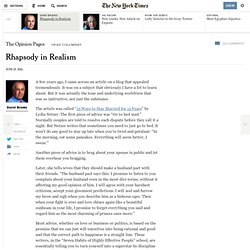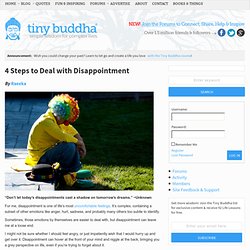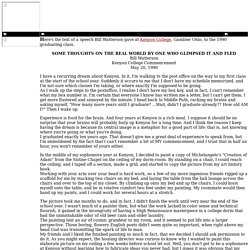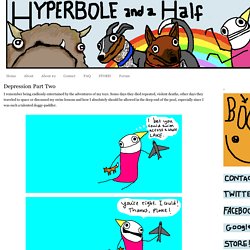

Learning this One thing Changed My Life. Via Amanda Johnsonon Jun 4, 2015 Why is life so f*cking hard sometimes?

This sure used to be a recurring question for me as I sat alone on my couch with tears streaming down my face. (10) Timeline Photos - Elizabeth Gilbert. Rhapsody in Realism. A few years ago, I came across an article on a blog that appealed tremendously.

It was on a subject that obviously I have a lot to learn about. But it was actually the tone and underlying worldview that was so instructive, not just the substance. The article was called “15 Ways to Stay Married for 15 Years” by Lydia Netzer. The first piece of advice was “Go to bed mad.” Normally couples are told to resolve each dispute before they call it a night.
Another piece of advice is to brag about your spouse in public and let them overhear you bragging. Later, she tells wives that they should make a husband pact with their friends. Most advice, whether on love or business or politics, is based on the premise that we can just will ourselves into being rational and good and that the correct path to happiness is a straight line. But Netzer’s piece is nicely based on the premise that we are crooked timber. People with a crooked timber mentality tend to see life as full of ironies. Straight White Male: The Lowest Difficulty Setting There Is. I’ve been thinking of a way to explain to straight white men how life works for them, without invoking the dreaded word “privilege,” to which they react like vampires being fed a garlic tart at high noon.

It’s not that the word “privilege” is incorrect, it’s that it’s not their word. When confronted with “privilege,” they fiddle with the word itself, and haul out the dictionaries and find every possible way to talk about the word but not any of the things the word signifies. 4 Steps to Deal with Disappointment. “Don’t let today’s disappointments cast a shadow on tomorrow’s dreams.”

~Unknown For me, disappointment is one of life’s most uncomfortable feelings. It’s complex, containing a subset of other emotions like anger, hurt, sadness, and probably many others too subtle to identify. Sometimes, those emotions by themselves are easier to deal with, but disappointment can leave me at a loose end. I might not be sure whether I should feel angry, or just impatiently wish that I would hurry up and get over it. Here are 4 steps I’ve recently identified in my own process for genuinely getting past disappointment: 1. One of the hardest things to do in a world where everything is immediate—we are all under external pressure, and time is a scarce resource—is to just let yourself experience a feeling. Even at the most difficulties times, such as grieving, on average we only allow ourselves 1 to 2 weeks off or work, and then we mostly expect to get back into normality again. 2. 3.
George Saunders's Advice to Graduates. It’s long past graduation season, but we recently learned that George Saunders delivered the convocation speech at Syracuse University for the class of 2013, and George was kind enough to send it our way and allow us to reprint it here.

The speech touches on some of the moments in his life and larger themes (in his life and work) that George spoke about in the profile we ran back in January — the need for kindness and all the things working against our actually achieving it, the risk in focusing too much on “success,” the trouble with swimming in a river full of monkey feces. The entire speech, graduation season or not, is well worth reading, and is included below. Calvin and Hobbes at Martijn's - Bill Watterson. Here's the text of a speech Bill Watterson gave at Kenyon College, Gambier Ohio, to the 1990 graduating class.

SOME THOUGHTS ON THE REAL WORLD BY ONE WHO GLIMPSED IT AND FLED Bill Watterson Kenyon College Commencement May 20, 1990 I have a recurring dream about Kenyon. In it, I'm walking to the post office on the way to my first class at the start of the school year. Suddenly it occurs to me that I don't have my schedule memorized, and I'm not sure which classes I'm taking, or where exactly I'm supposed to be going. As I walk up the steps to the postoffice, I realize I don't have my box key, and in fact, I can't remember what my box number is. Experience is food for the brain. In the middle of my sophomore year at Kenyon, I decided to paint a copy of Michelangelo's "Creation of Adam" from the Sistine Chapel on the ceiling of my dorm room.
The picture took me months to do, and in fact, I didn't finish the work until very near the end of the school year. Boy, was I smug. THIS IS WATER - By David Foster Wallace. Depression Part Two. I remember being endlessly entertained by the adventures of my toys.

Some days they died repeated, violent deaths, other days they traveled to space or discussed my swim lessons and how I absolutely should be allowed in the deep end of the pool, especially since I was such a talented doggy-paddler. I didn't understand why it was fun for me, it just was. But as I grew older, it became harder and harder to access that expansive imaginary space that made my toys fun. I remember looking at them and feeling sort of frustrated and confused that things weren't the same.
I played out all the same story lines that had been fun before, but the meaning had disappeared. Depression feels almost exactly like that, except about everything. Ira Glass on Storytelling. University of the Arts Commencement 2012 - Neil Gaiman. The Commencement Address.